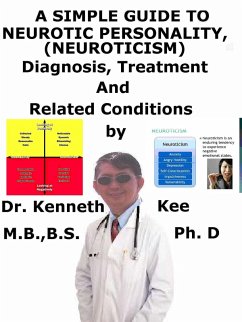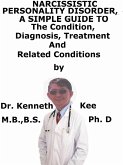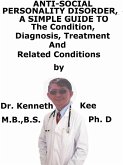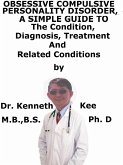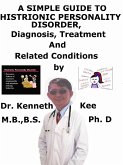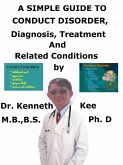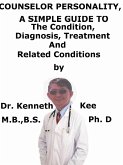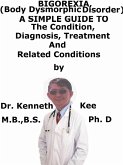This book describes Neurotic personality (Neuroticism), Diagnosis and Treatment and Related Diseases "Doubt is to certainty as neurosis is to psychosis. The neurotic is doubtful and is fearful about persons and things; the psychotic has beliefs and makes claims about them. In short, the neurotic has problems while the psychotic has solutions." Neurotic Personality (Neuroticism) is called a personality trait rather than a medical disorder. Neuroticism is a long-term tendency to be in a neurotic or anxious emotional state. People often confuse this personality trait with neurosis, a mental disorder. Neurotic personality is one of the traits that make up the big five-factor model of personality alongside extroversion, agreeability, conscientiousness, and openness. Within the Big Five dimension, Neuroticism, are 6 facets that further specify the traits that make a person neurotic. A neurotic personality has little natural safeguard against stress. The person sees everyday circumstances as far worse than they really are, and then blame him or her for the excessive pessimism and negativity. The patient might often feel: 1. Irritated 2. Angry 3. Sad 4. Guilty 5. Worried 6. Hostile 7. Self-consciousness 8. Vulnerable It helps identify people who are susceptible to psychological distress. People with low scores on neuroticism are more prone to handle stress effectively. People who score high on Neuroticism normally show these behaviors: 1. Emotionally reactive. 2. Generally unhappy. 3. Reacts more intensely than normal. 4. Pessimistic - Sees the negative more than the positive. 5. Often in a bad mood. 6. Inability to control emotions. 7. Easily gets upset and stressed. 8. Prone to addictions. 9. Gets easily frustrated by anxiety-inducing situations. 10. Poor coping ability. 11. Difficulty in sustaining healthy or long-term relationships. 12. Often blames themselves - Guilt-ridden. 13. Prone to psychological disorders. 14. Has low self-efficacy and self-esteem. Notes stressors are too big for them to deal with. 15. Poor job performance. People who score low on Neuroticism have all or some of these traits: 1. Calm under pressure. 2. Has stronger control on emotions and urges (Less reactive). 3. Has a strong coping mechanism. 4. Free from persistent negative feelings. 5. Comfortable in most social situations. 6. Is not easily angered or upset (Even-tempered) It is important to note that even though those who score low on Neuroticism have low negative emotions, it does not follow that they are high on positive emotions. If the patient can control the anxiety and stress, it may help stop the neurotic behaviors. Self-treatment may work if the anxiety is mild and transient. 1. Exercises every day. Thirty minutes is best, but even a 15-minute walk can help the patient to feel better. 2. Talks to someone. Tells family and friends what is causing the anxiety, and let them know how they can assist him. 3. Get enough sleep. A lack of sleep can make anxiety and stress worse. 4. Cut back on alcohol and caffeine. They can also make anxiety worse. 5. Eat well-balanced meals. Healthy meals and snacks enhance the energy. 6. Reframe the thoughts. It is not always easy, but the person should try to substitute negative thoughts with positive ones. With age the incidence of neuroticism drops TABLE OF CONTENT Introduction Chapter 1 Neurotic Personality Chapter 2 Causes Chapter 3 Symptoms Chapter 4 Diagnosis Chapter 5 Treatment Chapter 6 Prognosis Chapter 7 HEXACO Model Chapter 8 Neurosis Epilogue
Dieser Download kann aus rechtlichen Gründen nur mit Rechnungsadresse in A, B, CY, CZ, D, DK, EW, E, FIN, F, GR, H, IRL, I, LT, L, LR, M, NL, PL, P, R, S, SLO, SK ausgeliefert werden.

